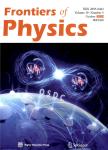Effects of frustration on explosive synchronization
Effects of frustration on explosive synchronization作者机构:Department of Mathematics and Physics North China Electric Power University Beijing 102206 China Department of Physics and the Beijing-Hong Kong-Singapore Joint Centre for Nonlinear and Complex Systems (Beijing) Beijing Normal University Beijing 100875 China College of Information Science and Engineering Huaqiao University Xiamen 361021 China
出 版 物:《Frontiers of physics》 (物理学前沿(英文版))
年 卷 期:2016年第11卷第6期
页 面:67-74页
核心收录:
基 金:X. Huang, J. Gao, T. S. Yu, and C. Xu were supported partly by the National Natural Science Foundation of China X. Huang was supported by the Fundamental Research Funds for the Central Universities of China Z. G. Zheng was supported partly by the Scientific Research Funds of Huaqiao University
主 题:coupled phase oscillator explosive synchronization frustration
摘 要:In this study, we consider the emergence of explosive synchronization in scale-free networks by considering the Kuramoto model of coupled phase oscillators. The natural frequencies of oscillators are assumed to be correlated with their degrees and frustration is included in the system. This assumption can enhance or delay the explosive transition to synchronization. Interestingly, a de-synchronization phenomenon occurs and the type of phase transition is also changed. Furthermore, we provide an analytical treatment based on a star graph, which resembles that obtained in scale-free networks. Finally, a self-consistent approach is implemented to study the de-synchronization regime. Our findings have important implications for controlling synchronization in complex networks because frustration is a controllable parameter in experiments and a discontinuous abrupt phase transition is always dangerous in engineering in the real world.



